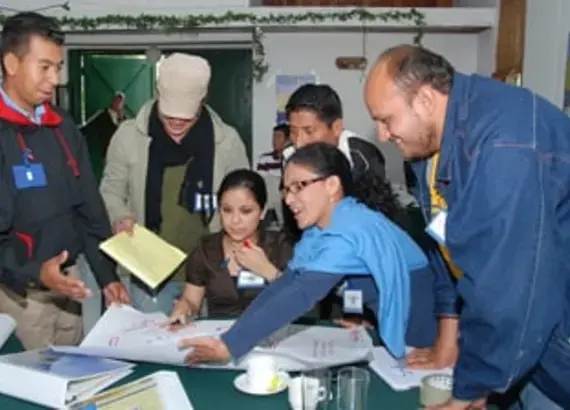
Success Story
First Class of Nicaraguan Leadership School Ready for Political Careers
The first class of graduates from Nicaragua's Certificate in Leadership and Political Management (CLPM) program – which NDI reported on late last year –are poised to jump into political careers. Already many class members have announced they will run for office in November, and some have been promoted to leadership positions within their parties.
The five-part training program took place in five locations across the country: two locations in the capital, Managua; Matagalpa in the north; and Bilwi and Bluefields in the Atlantic coast regions, where most of the country’s indigenous and Afro-Caribbean citizens live. The different components focused on leadership, strategic planning, political communication and negotiation, and democracy that delivers results for citizens, including traditionally marginalized groups such as women, indigenous peoples and Afro-decendents.
Nearly 70 percent of Nicaraguans are under the age of 30, but young people in the country remain disengaged from politics and government. They also are increasingly dissatisfied with political parties and government institutions, according to the findings of a recent NDI Democracy Survey.
To bring young people into the political arena and help build the next generation’s confidence in government, a consortium of Nicaraguan and international educational institutions created the CLPM to provide political training opportunities to young women and men. The age of the CLPM’s first class ranged from 16 to 35. The 415 students who received their certificates included 191 women and 224 men – 274 young party officials from 12 different political parties and 141 participants from over 70 civil society organizations.
NDI helped organize the consortium, which includes the American University (Universidad Americana, UAM), the University of the Nicaraguan Caribbean Coast Autonomous Regions (Universidad de las Regiones Autónomas de la Costa Caribe Nicaragüense, URACCAN), the Institute for Development and Democracy (Instituto para el Desarrollo y la Democracia, IPADE) and the George Washington University Graduate School of Political Management (GSPM).
NDI and its partners expect that, as participants progress across various fields, they’ll have opportunities to bring democratic values to a wide array of professions, including but not limited to politics.
“The seed to promote a political, economic and social transformation in Nicaragua in the next 20 years has been planted in our classroom,” said one of the students who spoke at the graduation ceremony. “Such a transformation will prove that politicians can respect the law and its institutions, and simultaneously alleviate poverty and guarantee our nation’s well-being.”
To strengthen the ties developed during the workshops, CLPM organizers intend to go beyond coursework and help form a strong alumni network. Both organizers and graduates have pledged to involve this year’s graduates in working with the upcoming CLPM classes and to seize opportunities to collaborate to strengthen the country’s democratic institutions.
“Considering what we’ve learned,” one political party participant said, “I hope we can find equilibrium in which political parties and civil society share common understandings and, furthermore, where we can build together a more democratic Nicaragua.”
The CLPM is an annual program to be carried out over five years with approximately 500 participants per year from civic organizations and all major political forces. The next class will kickoff in January 2012. The program is funded by the U.S. Agency for International Development (USAID).
Related:
Published July 28, 2011.



